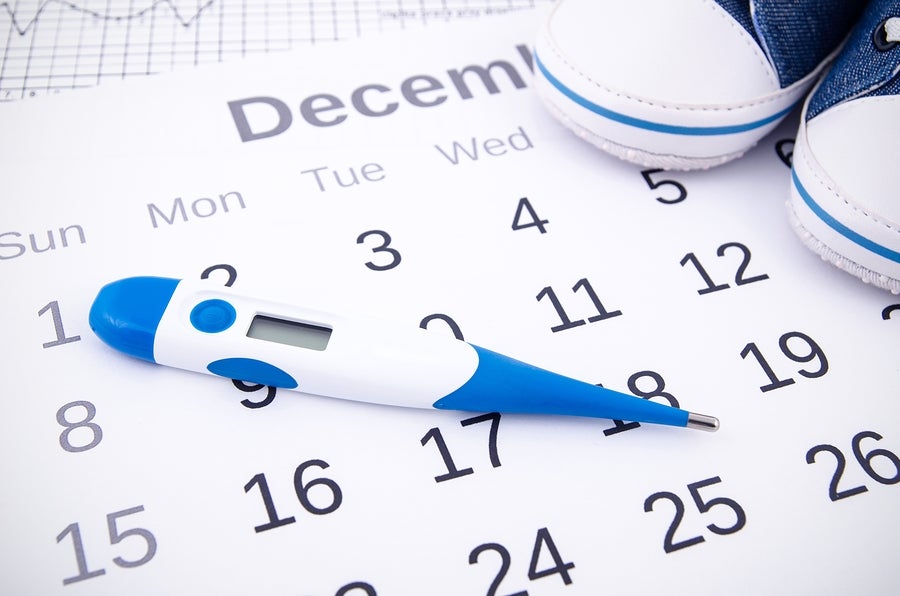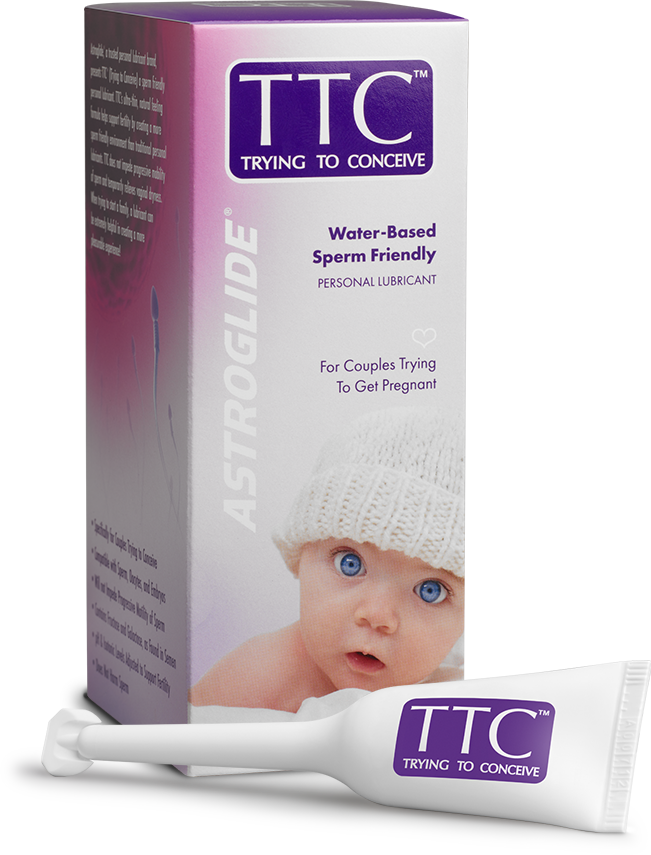Trying to Conceive? Follow These 10 Fertility Tips
Uncategorized
The best part is that it couldn’t be more fun — just take your clothes off, do what comes naturally, and a few weeks later you’ll see those tell-tale red or blue lines on the pregnancy test, right?
Unfortunately, despite what multiple nights binge-watching I Didn’t Know I Was Pregnant might imply, trying to conceive is not so easy for many couples.
Only 30% of couples successfully achieve pregnancy after trying for one cycle (about one month), while for nearly two thirds of couples, it takes at least three cycles. Not only that, but one out of every ten women has impaired fertility, though male fertility issues like low sperm count or low motility account for 35-40% of problems when couples are trying to conceive.
If those statistics stress you out, take comfort: there are many things you and your partner can do to improve your chances of making a baby. From simple lifestyle adjustments to medical interventions, there are a few ways you can make life easier when trying to conceive.
1. Upgrade your knowledge of the female fertility cycle.
Let’s face it — the sex ed most of us got in high school wasn’t comprehensive.
Did you know, for example, that the time your cycle starts to the time you ovulate might change, but the time between ovulation and the start of your period is pretty much set in stone? And that you have about a six-day window each month during which you can conceive? That means as soon as you ovulate, it’s time to get babymaking. But what if you don’t know when you (or your wife or female partner) is ovulating?
The nitty-gritty details of the female fertility cycle aren’t necessarily common sense, but they are essential learning when you’re trying to conceive. Charting your menstrual cycle won’t always cut it, though it’s a good start. Thankfully, fertility awareness gets way more sophisticated (and way more cool!) than simply putting stars on the calendar for every day you menstruate.
If you really want to get serious with fertility awareness, Planned Parenthood lists the following methods:
The Calendar Method:
This method takes a while because you have to track several cycles (8-12 are recommended). You simply plot the beginning of your cycle and when you menstruate on the calendar until you get a good idea of how long your cycles are.
Remember, not every woman has a 28-day cycle — yours may be a few days longer or shorter. By doing a little bit of math comparing your shortest and your longest cycles, you can get a rough idea of when you’re most fertile. This method won’t work, though, if you have very short or irregular cycles.
The Cervical Mucus Method:

For couples trying to conceive, this is more accurate than the calendar method, though it’s a bit messier.
It still involves a calendar, but instead of tracking when you menstruate, you create a daily log of what your cervical mucus feels like. When you ovulate, your cervical mucus becomes stretchy, a bit like raw egg whites. (Apologies if you’re eating breakfast right now.)
The Temperature Method:
Ovulation raises your body temperature, so another way to determine when you’re entering your fertile window is by using a basal thermometer.
Like the other fertility awareness methods, this takes a bit of dedication: to take your basal temp, you need to take your temperature as soon as you wake up in the morning, before you get out of bed, every day.
The Symptothermal Method:
Why use one method when you can use all three?
The symptothermal method of fertility awareness involves a combination of the calendar, cervical mucus and temperature methods. If you’re trying to conceive and find that one method isn’t helping you get pregnant, it might help to combine methods to get a more precise idea of when you’re fertile.
While many couples use fertility awareness to help avoid getting pregnant when they’re not trying to conceive, knowing when you’re most fertile is one of the most important steps you can take toward making that baby.
Thankfully, there are plenty of apps that can make it easier! Check out our five favorite fertility apps.
2. Use the right personal lubricant.
Did you know that if you’re trying to conceive, your lube could be holding you back?
As we all know, sperm has to swim to get to the egg, and the journey is pretty long: that microscopic little cell has to travel six inches through the vagina and uterus to reach the egg in the fallopian tube, a process that takes at least half an hour. And that’s when conditions are right.

Remember that eggy cervical mucus? It actually provides a perfect environment for the sperm to travel through. Personal lubricant can alter that environment by affecting the vagina’s PH levels, as well as osmolality (the concentration of sodium, potassium and other substances), both of which can hinder the movement of sperm.
Take heart, though — just because you’re trying to conceive doesn’t mean you can’t use lube.
You just have to make sure you’re using a personal lubricant made just for couples who are trying to conceive, so that you can keep sex wet while not slowing down your swimmers. After all, the process of making a baby is supposed to be fun, and using a lubricant like ASTROGLIDE TTC can help make your babymaking sessions more comfortable and long-lasting.
Studies show that ASTROGLIDE TTC is compatible with sperm, oocytes (egg cells) and embryos. With adjusted PH levels and osmolality and a consistency close to that of your own cervical mucus, ASTROGLIDE TTC allows sperm to move freely. In addition, it contains galactose, a sugar found naturally in semen, and fructose, the main energy source for sperm.
3. Take the right vitamins and supplements.
Fertility can vary a lot based on your nutrition. If you’re a woman trying to conceive, you never know which cycle is going to be the one that ends up in a pregnancy, so it’s a good idea to start taking prenatal vitamins as soon as you start trying. If you’re a man and you’re trying to conceive, you need to worry about vitamins too! Without adequate vitamin C and E, your sperm will clump together, making you less fertile.
Oh, and women: if you want more fertility, get more D — vitamin D, that is.
Without enough vitamin D, your reproductive tissues don’t function optimally, and if you’re reading this post, there’s a good chance you might be one of the billion people worldwide who have vitamin D deficiency. Vitamin D can be found in eggs, dairy and oily fish, but you can also find it in multivitamins and as a separate supplement.
4. Make healthy adjustments to your lifestyle.
When you’re trying to conceive, many lifestyle factors can help or hinder your babymaking progress. If you’re a man, alcohol, smoking, excess weight and stress can all hinder your ability to produce healthy sperm. Besides, if you’re having kids, don’t you want to kick that smoking habit before they show up in your house?
For women, a healthy lifestyle is important not only to conceive a child, but to keep it healthy through gestation. As with men, being underweight or overweight can affect your reproductive hormone balance, and stress also lowers the odds of conception. Eating a healthy, balanced diet and getting a moderate amount of exercise can help improve your odds of successfully conceiving (but be careful, as too much physical activity can inhibit ovulation).
5. Don’t hesitate to see your doctor.
If you’ve been trying to conceive for several months and your tests keep coming back negative, get thee to your physician. Your doctor can test for vitamin D deficiency as well as a number of other things affecting your fertility, whether you’re a man with a low sperm count or a woman with impaired fertility. A physician can also help you sort out fertility myths from facts so you have the best chance of success.
When’s the best time to ask your doctor about fertility? As early as possible.
When you decide to begin trying to conceive, it’s a good idea to let your doctor know your intentions and get his or her advice on how to proceed based on your medical history. For example, if you’re a woman with a history of irregular menstrual cycles, your doctor might refer you to an endocrinologist to determine whether the irregularity may be due to a hormonal imbalance like polycystic ovarian syndrome. If you have a history of heavy or painful periods, it could be a sign of endometriosis, a menstrual disorder that can cause obstructed fallopian tubes and impaired fertility.
If you have any medical history that could impact your fertility, your physician can help you get the right treatment to conceive successfully.
If other medical interventions aren’t working, you might want to consider fertility treatments.
This can include medications designed to help women ovulate, intrauterine insemination and in vitro fertilization. Remember that fertility issues are not a moral failing, and can happen to anyone. The sooner you get help from your physician, the better your chances at having a baby on your schedule.
6. Strive For a Healthy Body Weight
Beyond making some healthy adjustments to your lifestyle, it can be helpful to strive for a healthy body weight when you are trying to conceive.
Studies have shown that women who have a BMI of between 20 and 25 have an easier time getting pregnant than women who have a BMI above or below that range. If you find yourself outside of that range, it can be helpful to make changes to strive toward a healthier body weight. (If you’re not sure what your BMI is, you can use an online BMI calculator to figure out where you stand.)

However, keep in mind that while your weight may have an effect on your ability to conceive, falling outside the ideal range for BMI doesn’t necessarily mean that you won’t be able to have a child. Women both over and under their ideal weight have babies every day.
Your weight is just one facet of your overall health, and what’s most important when it comes to how to conceive is that you are taking the best possible care of yourself. It’s never a good idea to crash diet or binge eat just to get to your ideal BMI as these things will end up doing far more harm than good to your health and can make it harder to conceive.
Also keep in mind that while your BMI is a good tool for tracking and maintaining a healthy weight, it is far from perfect.
Every body is different. For example, if you are an athlete or spend a lot of time at the gym, you may carry more muscle on your body than the average person which can skew your BMI up above the healthy range. However, obviously this doesn’t mean that you’re at an unhealthy weight. When it comes to BMI a little common sense goes a long way, but if you’re uncertain of what weight would be best for your frame, ask your doctor.
7. Cut Back on Strenuous Exercise
While exercise and maintaining a healthy body weight are crucial factors in how to conceive, strenuous exercise can actually do more harm than good.
Women who engage in strenuous exercise can sometimes experience disturbances in their menstrual cycles — which is obviously a big problem when you’re trying to conceive. If you’re trying to get pregnant, try switching out your more hardcore routines for something a little less intense.
8. Quit Smoking
We know. This one is super hard. Kicking a tobacco habit can be one of the hardest things you do in your life.
However, if you’re serious about trying to conceive, both you and your partner need to give up the cigarettes. Smoking can cause a woman’s uterus to be less receptive to an egg, and in men it can significantly lower sperm count — both of which can seriously impact your ability to get pregnant.
Not only is it important that you both quit smoking, but you both should do what you can to avoid secondhand smoke as well. Secondhand smoke has all of the same dangerous chemicals as if you’d smoked a cigarette yourself and it can have the same negative impact on your health. Avoiding smoke all together is the only way for you both to protect yourselves and to give you the best chance of conceiving.
9. Cut Down On Stress
When it comes to how to conceive, one of the best things that you can do for yourself and your partner is to cut down on the amount of stress you have in your lives.
From stress at work to conflict with family members, all of it can add up to some serious negative consequences on your ability to get pregnant. In fact, some studies suggest that up to 30% of fertility issues maybe be caused by elevated stress levels — so anything you can do to make your life a little more serene is key.
Keep in mind, that beyond the normal pressures of day-to-day life, a major cause of stress for couples who are trying to conceive can be the process of trying to conceive itself. If you’re constantly obsessing over whether or not this will be the month that you get pregnant, you’re only going to be adding to your stress levels and make it less likely that you will.
To avoid this catch-22, do your best to focus on the joy and excitement of trying to conceive. It’s a special time in your life and everything will go more smoothly if you take the time to enjoy it.
10. Reach Out For Support
Whether or not you and your partner are experiencing challenges with fertility, the process of trying to conceive can be more complicated than you might expect.
You may experience setbacks and disappointments or you may need someone who has a little more experience with how to conceive than you do to go to for advice. Whatever the case may be, at some point along the way, you and your partner are going to need to call in backup. Don’t be afraid to reach out to family and friends who have been there for the support that you need.
And yes, that goes for men, too.
It’s Time to Get Started
The time you and your partner spend trying to conceive should be exciting and fun, not nerve wracking and clinical. Even if you’re having sex for reproductive purposes, there’s no reason it shouldn’t be mindblowing!
So read some erotic novels, get out your favorite fuzzy handcuffs, put on your best lingerie and grab some ASTROGLIDE TTC personal lubricant. With the right lube, as well as knowledge about your fertility, vitamins and nutrients and the help of your physician, you can help make the dream of parenthood come true for you and your partner.
What do you think about our tips on how to conceive?
Are there any others that you think we should add? Let us know your thoughts by tweeting us @ASTROGLIDE.
Images are for illustrative purposes only.
